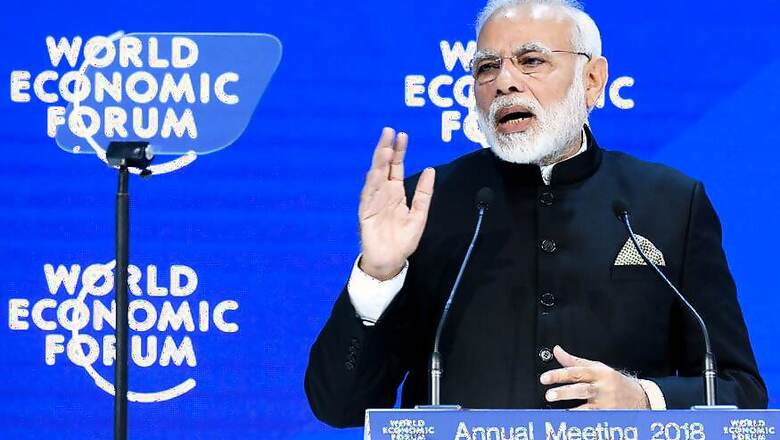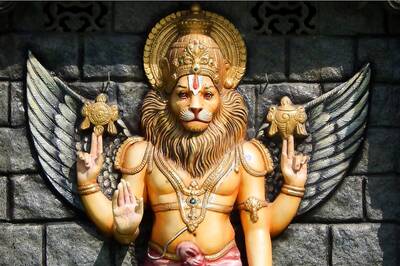
views
It has been four days since Prime Minister Narendra Modi delivered the opening speech at the World Economic Forum in Davos. However, it continues to reverberate among politicians, bureaucrats, industrialists, media and the public. What could be the reason? Was it because of the platform or the content of his speech or the Modi factor or the way he projected India?
The theme of this year’s World Economic Forum was ‘Creating a Shared Future in a Fractured World’ with a focus on shaping the future through collaboration. The top annual global business meet was attended by 70 head of states, 38 heads of major international organizations such as the WTO, the IMF and the World Bank, and nearly 2,000 CEOs including over 100 from India. It is a very attractive platform to market an offering—in this case India. Modi showcased his marketing skills in identifying his target audience and making the correct pitch, in a correct manner. Modi was statesman-like and his speech was relevant for the forum and beneficial for India.
Choosing Hindi among such a wide and vivid audience not only helped Modi express his thoughts in a more provoking way but also helped in setting the right tone for 'Vasudhaiva Kutumbakam'. He connected to the audience, first by giving humorous one-liner like tweeting being a bird’s thing and amazon being a jungle in comparing the changes of the last two decades since Indian PM Deve Gowda visited Davos for WEF. He told the audience how the Indian GDP has increased 6 times since then. Some people may see it as a political comment but Modi said it as the PM of the country to highlight India’s growth.
Modi listed climate change, terrorism and globalization as the three biggest challenges facing the world. By focusing on these important global issues on which the world is increasingly finding itself divided, Modi attempted to position India as an emerging global leader that is ready to rise above local issues to take leadership in finding solutions to global problems. Climate Change and terrorism are threats to the entire world and require a global response. Globalization has brought about prosperity across vast regions of the world and lifted millions out of poverty. The recent rise in protectionist tendencies among countries is a concern for all believers in free trade, and can be addressed only through shared understanding.
Like a true global leader Modi commented, “Many societies & countries are becoming self-centered. It seems that globalization, as opposed to its definition, is shrinking. Such misplaced preferences can't be considered any lesser threat than terrorism or climate change. We must admit shine of globalization is fading.” Nations need to come together on these important global issues and Modi chose an apt platform to raise this.
Staying relevant to the theme of the summit, Modi quoted Gandhi in his speech. Mahatma Gandhi is a globally recognized and respected figure. Modi said, “Mahatma Gandhi's Principle of Trusteeship to use things according to one's need is important. He was against use of anything for one's greed. We're today exploiting nature for our greed. We need to ask ourselves if this is our progress or regression”
If he spoke about ‘Sabka Saath Sabka Vikas’ as his motto, he also gave 'Reform, Perform, Transform’ as his slogan for a global audience. His speech delivered a nice blend of past and future. On the one hand he said, “We in India are proud of our democracy and diversity. For a society with diverse religions, cultures, languages, attires and cuisines, democracy is not just a political system but a way of living,” while on the other hand he showcased India as a land of opportunities saying that investing, traveling, manufacturing, and exporting everything is much easier now. He said, “We are now a financial system which is fully prepared and integrated for digital transactions. More than 90% of the FDI approvals have been put on the automatic approval route. As a result of these changes, there has been a sharp rise in FDI in the past three years–from 36 billion USD in 2013-14 to 60 billion USD in 2016-17”.
In such a forum, a perception that India is united on key issues such as climate change, terrorism, globalization, national security, and well-accepted economic reforms sends a strong signal of stability and reassurance to potential stakeholders and partners in the country’s progress. Therefore, on important issues, conflicting signals from our politicians rooted in domestic politics damage the cause of positioning India for global leadership, and should be reserved for politics at home. It is disappointing to see the opposition parties in India commenting negatively on reforms and oppose for the sake of opposing. Such acts undermine the government’s efforts and don’t help anyone.
To sum it all up, Modi hit the right notes in his speech at Davos. He projected his country as an emerging global power ready for leadership on important global issues. He aptly presented India’s reforms that have been done and the way ahead. He did justice to the opportunity by talking as a leader of the country and not just that of a political party.
(Siddharth Shekhar Singh is Associate Dean and Associate Professor of Marketing at the Indian School of Business, Hyderabad and Mohali. The views expressed are his own.)

















Comments
0 comment